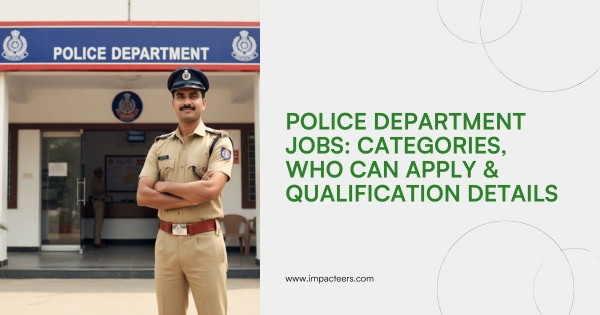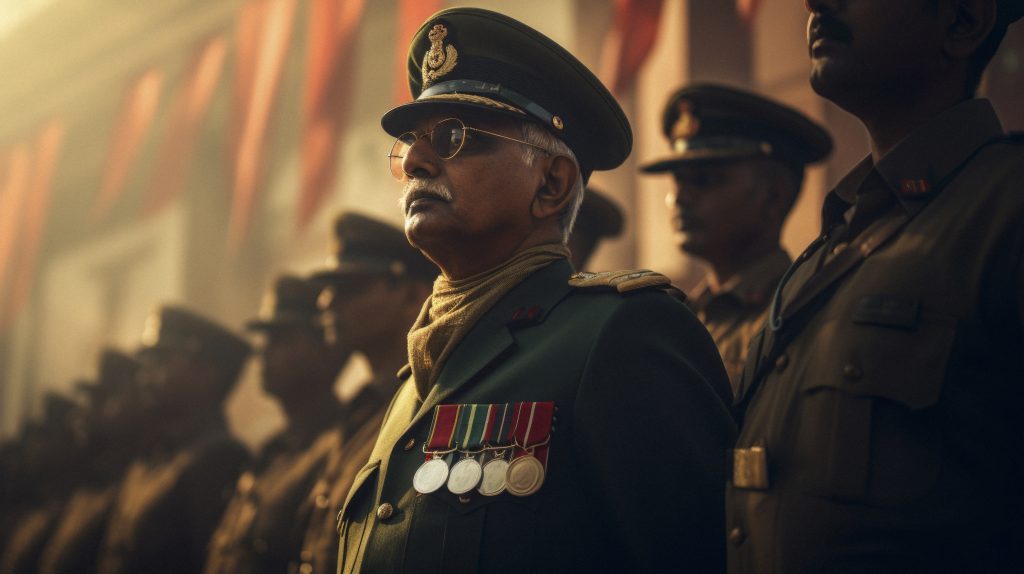In India, a career in the police department jobs isn’t just a job. It’s a calling. Wearing the khaki uniform is about service, courage, and pride. For some, it’s a childhood dream. For others, it’s the best way to serve society while enjoying the benefits of a government job.

But here’s the real question—who can actually apply? What qualifications do you need? And what kinds of roles exist in the police department jobs category? Let’s explore in detail.
Visit Us >>>> https://www.impacteers.com/home
Why Choose a Career in the Police Department?
Choosing the police force means choosing responsibility. Here’s why many young people are drawn toward it:
- Respect in Society – Police officers are seen as protectors.
- Job Security – Like most government jobs, police careers are stable.
- Growth Opportunities – Clear promotions from constable to top ranks.
- Variety of Roles – From patrolling to cybercrime investigations.
- Serving the Nation – The chance to make real change.
I remember a story from my town. A boy named Arjun always wanted to join the police. His family wasn’t well off, but he worked day and night, cleared the government exam, and today he’s a sub-inspector. His mother says, “Every time I see him in uniform, my chest swells with pride.”
Categories of Police Department Jobs
The police department in India isn’t a single role. It’s a whole system with multiple layers.
1. Constable
- Entry-level position.
- Handles patrolling, assisting in investigations, and maintaining law and order.
2. Head Constable
- Senior to constable.
- Works as team leader for constables and reports to sub-inspector.
3. Sub-Inspector (SI)
- Popular position among aspirants.
- In charge of a police station (small or medium).
- Has authority to investigate cases.
4. Inspector
- Higher authority than SI.
- Responsible for bigger police stations and staff management.
5. Deputy Superintendent of Police (DSP)
- Recruited through state public service commissions.
- A gazetted officer role with command responsibilities.
6. Indian Police Service (IPS)
- Top-level rank, recruited through UPSC Civil Services Exam.
- IPS officers lead districts, states, and national agencies.
7. Specialized Wings
- Cybercrime unit.
- Traffic police.
- Crime branch.
- Intelligence wing.
- Anti-terrorist squads.
Who Can Apply for Police Department Jobs?
Not everyone qualifies. Here are the basic eligibility rules:
- Nationality: Must be an Indian citizen.
- Age:
- Constable: 18–25 years (relaxation for reserved categories).
- SI: 20–28 years.
- IPS: 21–32 years.
- Constable: 18–25 years (relaxation for reserved categories).
- Educational Qualification:
- Constable: 10th/12th pass.
- SI: Graduate in any stream.
- IPS: Graduate + UPSC Civil Services.
- Constable: 10th/12th pass.
- Physical Fitness:
- Height, chest, and running endurance tests apply.
- For example, male candidates often need to run 1.6 km in 6 minutes.
- Height, chest, and running endurance tests apply.
- Medical Standards: Vision, hearing, and overall health are checked.
Exams for Police Department Jobs
Different exams open doors to different posts.
1. Constable & SI Exams
- Conducted by State Police Recruitment Boards or State Public Service Commissions.
- Tests include written exam, physical fitness test, and medical exam.
2. UPSC Civil Services Exam (for IPS)
- The toughest gateway to top police ranks.
- Prelims → Mains → Interview → Training at Sardar Vallabhbhai Patel National Police Academy.
3. SSC CPO Exam
- Conducted by Staff Selection Commission.
- Recruits Sub-Inspectors for CAPFs and Delhi Police.
4. CAPF Exam
- UPSC conducts it for Assistant Commandant positions in paramilitary forces.
Qualification Details: Step by Step
- Constable – 10th/12th pass, physically fit.
- SI – Bachelor’s degree, fit for endurance tests.
- Inspector – Promoted from SI rank.
- DSP – State PSC exam + graduation.
- IPS – UPSC Civil Services + training.
In short, higher posts need higher qualifications. But even with basic schooling, you can start as a constable and climb the ladder.
Life as a Police Officer: What to Expect
The job isn’t always easy. Long hours, unpredictable shifts, and dealing with tough situations are part of it.
But there are rewards:
- The satisfaction of solving cases.
- The pride of wearing the uniform.
- Opportunities to serve people during emergencies.
- Growth into respected ranks with authority.
Challenges in Police Jobs
- Work pressure – Cases pile up.
- Risk – From criminals, protests, and high-pressure situations.
- Transfers – Frequent posting changes.
- Work-life balance – Holidays are rare during festivals.
Still, most officers say the pride outweighs the struggles.
How to Prepare for Police Exams
- Start with basics – General knowledge, current affairs, reasoning, and quantitative aptitude.
- Focus on fitness – Running, push-ups, long jump, and stamina are tested.
- Practice mock tests – They build speed and confidence.
- Stay consistent – Daily 2–3 hours of preparation can make a big difference.
- Seek guidance – Coaching or mentorship can clear doubts and build discipline.
Why Mentorship Matters in Police Recruitment
The journey isn’t just about books. Many candidates fail because they lack direction. This is where mentorship helps.
Impacteers Mentorship provides:
- Personal study schedules.
- Doubt clearing sessions.
- Fitness guidance tips.
- Motivation during tough phases.
A mentor doesn’t just teach; they keep you accountable and focused.
Career Growth in Police Department Jobs
- A constable can rise to Head Constable, SI, and Inspector with time.
- An SI can become DSP, then SP.
- IPS officers can lead entire states as Director General of Police (DGP).
With patience and performance, promotions are steady.

Conclusion
A career is challenging in the police department but is deeply beneficial. From constables to IPS officers, every role takes responsibility and pride.
If you are serious about this route, start early. Work on your fitness, prepare for the exam, and keep yourself motivated. And if you ever feel lost, do not hesitate to take guidance. Programs like impacter mentorship can push you according to your need.
In the end, police department jobs are more than employment—they’re a lifelong commitment to protect and serve.
About Us >>>> https://blog.impacteers.com/
FAQs on Police Department Jobs
1. What is the minimum qualification for police department jobs in India?
For constables, it’s usually 10th or 12th pass. For Sub-Inspector and higher posts, a graduation degree is required.
2. How do I join as an IPS officer?
You need to clear the UPSC Civil Services Exam, followed by training at the National Police Academy.
3. Are there physical fitness tests for police jobs?
Yes. Candidates should clean up height and chest measurement along with running, long jump, high jump and endurance tests.
4. What is the salary of a police officer in India?
Constables earn ₹ 25,000- ₹ 40,000/month, while IPS officers can earn ₹ 70,000- ₹ 1,50,000/month plus allowances..
5. Is coaching necessary for police exams?
Not mandatory. But structured programs like Impacteers Mentorship help with strategy, fitness tips, and discipline.



Post Comment